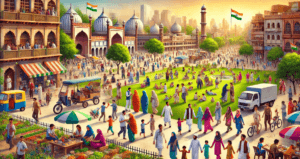End Everyday Discrimination Against Muslims in India: 5 Powerful Ways to Foster Equality and Unity
In India, Muslims face increasing discrimination, particularly under the rule of the Hindu nationalist BJP. Hate speech, derogatory remarks, and communal slurs have become more common, with prominent figures like Yogi Adityanath and Ramesh Bidhuri using offensive language. Muslims also face public humiliation during religious celebrations and are often targeted in media stereotypes. This deep-rooted bias stems from historical perceptions, where Muslims are seen as outsiders or threats. Laws like the Citizenship Amendment Act and mass surveillance further marginalize them.
To overcome this, Muslims must reclaim their identity, engage politically, and celebrate their contributions. However, change can only happen if the Hindu majority reflects on their role in perpetuating this discrimination, working towards an inclusive, pluralistic India.

End Everyday Discrimination Against Muslims in India: 5 Powerful Ways to Foster Equality and Unity
In recent years, India has witnessed a troubling rise in hate speech and discrimination against Muslims, particularly under the leadership of the Hindu nationalist Bharatiya Janata Party (BJP). Reports from organizations like the India Hate Lab reveal over 1,100 incidents of hate speech between 2022 and 2023, with nearly 99% of these incidents targeting Muslims. High-profile politicians, including Uttar Pradesh Chief Minister Yogi Adityanath, have openly used derogatory terms like “Kathmulla” to refer to Muslims, while BJP MP Ramesh Bidhuri labeled a Muslim colleague in Parliament as a “terrorist” in 2023. Such language, once considered shocking, has become alarmingly normalized by Hindu nationalist groups.
Symbols of Hate and Daily Humiliation
During Hindu festivals like Shivratri and Holi, processions in states such as Bihar and Rajasthan have featured displays promoting anti-Muslim conspiracy theories like “love jihad”—a baseless claim that Muslim men lure Hindu women into marriage to convert them. Alongside these public provocations, Muslims face physical attacks on mosques, harassment of interfaith couples, and social boycotts. This constant hostility forces many Muslims to live in fear, reinforcing their marginalization in a society where they are made to feel like outsiders.
Media Stereotypes and Internalized Shame
Mainstream media, films, and social platforms often amplify negative stereotypes of Muslims. Hindi cinema frequently portrays them as villains, extremists, or poor laborers, while TV debates reduce Muslim voices to tokens or scapegoats. Over time, this public vilification has led many Muslims to hide their identity—avoiding traditional attire like skullcaps or hijabs, or even suppressing their religious practices in public. Scholars compare this struggle to W.E.B. Du Bois’s idea of “double consciousness,” where Muslims feel torn between their true selves and a society that views them with suspicion.
Roots of Discrimination: A Historical Divide
The roots of this discrimination run deep. Dutch scholar Peter Van der Veer explains that Hindu nationalism has long portrayed Muslims as “foreign invaders” responsible for historical conflicts, a narrative that intensified during India’s partition in 1947. This ideology frames Muslims as disloyal—sympathetic to Pakistan or global jihadist movements—despite most Indian Muslims having no ties to these groups. Such stereotypes fuel policies and attitudes that treat Muslims as second-class citizens.
Systemic Inequality and Legal Bias
This prejudice is evident in systemic disparities. For instance, Hindu refugees from neighboring countries are fast-tracked for citizenship under the 2019 Citizenship Amendment Act (CAA), while Muslim refugees are excluded. Government jobs remain disproportionately inaccessible to Muslims, yet they are overrepresented in prisons, often accused of crimes without evidence. Laws like the Unlawful Activities Prevention Act (UAPA) are weaponized to target Muslim activists, as seen after the 2020 Delhi riots, where many were jailed without trial.
The Psychological Toll of Prejudice
The constant scrutiny Muslims face mirrors what philosopher Frantz Fanon called the “racial gaze”—being seen not as individuals but as symbols of threat. Everyday acts like praying in public or speaking Urdu can attract suspicion. For Muslim women, wearing a hijab has led to bans in schools and workplaces, as seen in Karnataka. Such policies send a clear message: Muslims must downplay their identity to be accepted.
Reclaiming Identity and Demanding Change
Indian Muslims now stand at a crossroads. To counter marginalization, communities are pushing for political representation, economic empowerment through local businesses and education, and cultural campaigns celebrating Muslim contributions to India’s history—from Mughal architecture to freedom fighters like Ashfaqulla Khan. Activists argue that true equality requires rejecting stereotypes of Muslims as either “dangerous” or “helpless” and asserting their rightful place as equal citizens.
A Call for Reflection
Progress also demands introspection from India’s Hindu majority. Hindu nationalist groups must confront the bigotry embedded in their ideology and acknowledge how anti-Muslim rhetoric fuels violence and exclusion. Beyond political slogans, India’s future as a diverse democracy depends on embracing Muslims as fellow citizens, not perpetual outsiders.
Conclusion
The question today is whether India can uphold its founding ideals of pluralism and justice. For Muslims, equality means safety to practice their faith, fair access to opportunities, and freedom from dehumanizing stereotypes. For the nation, it means choosing unity over division—recognizing that democracy cannot thrive while millions live under the shadow of fear and prejudice. The struggle for Muslim rights is not just their fight; it is a test of India’s commitment to its own constitutional values.
You must be logged in to post a comment.